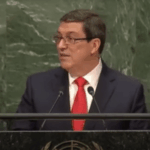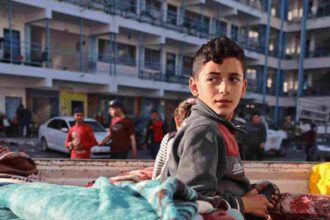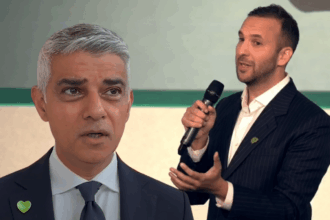Stormont’s landmark document on tackling poverty in the North of Ireland has been subjected to scathing criticism as it reaches the end of its consultation period. The report, entitled The Executive’s Anti-Poverty Strategy (2025-2035) was also criticised upon release in June 2025, with the Social Democratic and Labour Party’s (SDLP) Mark H. Durkan describing it as “underwhelming” as he called:
into question the Executive’s ability to tackle poverty.
Save the Children NI’s Peter Bryson also said at the time that the strategy:
raises serious questions about the Executive’s commitment to children, families and communities impacted by poverty.
Stormont’s anti-poverty strategy: ‘underwhelming’ at best
Subject to a two-decade(!) delay and billed by Minister for Communities Gordon Lyons as a “strategy which could help make a meaningful difference to those experiencing socio-economic disadvantage in our society”, the document sets out its definition of poverty as meaning that:
a person or family’s income and other resources are not sufficient to meet their basic needs. This includes paying for essentials such as housing, heating, food, clothing and social activities.
It begins by laying out the core statistics related to poverty (after housing costs) in the six counties, with 18% and 15% of the population overall suffering relative and absolute poverty respectively. For children the equivalent figures are 25% and 21%. 20% of:
those individuals living in families where someone is disabled are considered to be in relative poverty.
A gender disparity also exists, with 16% of women and 14% of men respectively placed in poverty by our dysfunctional economic system. The absolute poverty figures for the population as a whole had been steadily falling for decade to a figure of 12%, before climbing in recent years to the current 15%.
Three key pillars with no substance
It then goes on to focus on “three key pillars” where actions will be put in place to supposedly aid those with limited means:
- Minimising Risk – risk factors for entering a state of impoverishment are listed, such as low educational attainment, debt and disability are among those cited
- Minimising Impacts – this outlines the consequences people suffer as a result of poverty, including negative health impacts, increased exposure to crime and substandard housing
- Exiting Poverty – finally four ways out of poverty are listed: economic/employment conditions; employment; further education; and childcare
A range of policy initiatives are then listed as a means of addressing these goals, such as programmes claiming to bolster education, improve health and provide better careers guidance.
More than words, we need action
However, civil society groups such as the Law Centre NI have issued scathing criticism on the Stormont plan, calling it a:
grossly inadequate approach to poverty [which] cannot be accepted.
The charity, which provides “free and independent legal services” castigated the authors for failing to include “measurable objectives, targets, and timelines”, prevaricating on the disastrous two-child limit on benefit payments, and ignoring the plight of the economically disadvantaged migrant community. In an X post, it concluded by saying:
Northern Ireland needs more than words. We need action. We need accountability. We need a strategy that works, for everyone.
The report’s call to merely “undertake research to understand the impact of Westminster’s two child limit on poverty indicators” has come in for particular criticism, given the clear evidence of its harm.
Similarly damning were the comments of Dr Ciara Fitzpatrick, a senior lecturer in law at Ulster University, who slammed the strategy as:
devoid of solutions that would make a genuine difference in people’s lives.
She also said the work is:
insulting – it needs to be re-written. The NI Executive needs to demonstrate that they care about disadvantaged communities.
The Women’s Support Network concentrated on the views of ordinary women who acted as participants in the strategy’s focus group. They put forward the simple steps that could have been brought in to provide immediate help to those on low income, such as “Giving an increase in money to the people that need it and then capping the costs of school uniforms,” or an additional welfare payment at Christmas:
Give people an extra payment of their benefits like they do down South, that would help because lots of people really struggle at Christmas.
Another simply declared:
There’s nothing in the draft to help me.
Concrete solutions distant from the minds of the business-bought political class
The elephant in the room that went almost entirely unaddressed in the 31-page government plan is the vampiric economic system causing all this misery and inequality in the first place.
While the strategy dedicates four tiny paragraphs to somewhat veiled references to blood-sucking employers, acknowledging that “in-work poverty has largely continued on an upward trend and stood at almost 13% in 2018/19” and mentions “Northern Ireland’s issue in relation to low pay relates to the private sector”, it offers scant solutions to the core dysfunction of an economic model that allows enormous concentration of resources in few hands. The word ‘union’ appears not once in Stormont’s great masterplan.
Boosting the powers of unions and throwing off the shackles of notoriously restrictive laws on organising would enable such groups to fight more effectively for better terms and would shift things in favour of those being increasingly impoverished. Lessening the power of bad employers would also decrease their ability to lobby for the destruction of welfare services generally, benefiting everyone else in the process.
Such an approach is clearly distant from the minds a political class that has long since sold out to big business, however. They would rather give handouts to polluters and genocidaires than assist those unable to feed their children or heat their homes. Until they’re taught a lesson at the ballot box, we will continue to suffer through glossy brochures promising much but ultimately delivering sweet FA.
Featured image via the Canary













